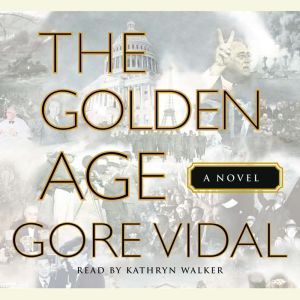

The Golden Age
Author: Gore Vidal
Narrator: Kathryn Walker
Abridged: 6 hr 12 min
Format: Digital Audiobook Download
Publisher: Random House Audio
Published: 09/19/2000
Categories: Fiction, Literary Fiction
Synopsis
The historical novel is once again in vogue, and Gore Vidal stands as its undisputed American master. In his six previous narratives of the American empire-Burr, Lincoln, 1876, Empire, Hollywood, and Washington, D.C.-he has created a fictional portrait of our nation from its founding that is unmatched in our literature for its scope, intimacy, political intelligence, and eloquence. Each has been a major bestseller, and some have stirred controversy for their decidedly ironic and unillusioned view of the realities of American power and of the men and women who have exercised that power.
The Golden Age is Vidal's crowning achievement, a vibrant tapestry of American political and cultural life from 1939 to 1954, when the epochal events of World War Two and the Cold War transformed America, once and for all, for good or ill, from a republic into an empire. The sharp-eyed and sympathetic witnesses to these events are Caroline Sanford, Washington, D.C., newspaper publisher turned Hollywood pioneer producer-star, and Peter Sanford, her nephew and publisher of the independent intellectual journal The American Idea. They experience at first hand the masterful maneuvers of Franklin Roosevelt to bring a reluctant nation into World War Two, and later, the actions of Harry Truman that commit the nation to a decades-long twilight struggle against Communism-developments they regard with a marked skepticism, even though they end in an American global empire. The locus of these events is Washington, D.C., yet the Hollywood film industry and the cultural centers of New York also play significant parts. In addition to presidents, the actual characters who appear so vividly in the pages of The Golden Age include Eleanor Roosevelt, Harry Hopkins, Wendell Willkie, William Randolph Hearst, Dean Acheson, Tennessee Williams, Joseph Alsop, Dawn Powell-and Gore Vidal himself.
The Golden Age offers up United States history as only Gore Vidal can, with unrivaled penetration, wit, and high drama, allied to a classical view of human fate. It is a supreme entertainment that will also change readers' understanding of American history and power.


